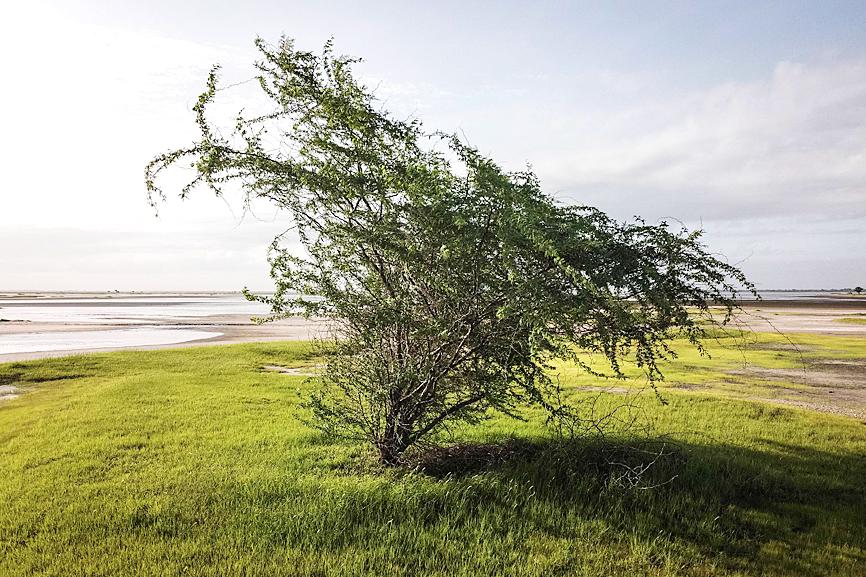Acacia has had a cultural use spanning 50,000 years, a study analyzing ancient campfires in Australia’s Western Desert has found.
There are about 1,350 species of acacia found throughout the world and close to 1,000 of these grow in Australia.
Commonly known as “wattle” in Australia, Acacia is the largest genus of vascular plants in the country.

Photo: AFP
The practice of archeobotany was used by researchers to analyze charcoal preserved in the oldest archeological site on Martu Country.
The research, led by Chae Byrne from the University of Western Australia, alongside Martu indigenous owners, found that Australia’s floral emblem has been integral to indigenous survival for tools, food and medicine for more than 50,000 years.
By examining desert rock shelters in Katjarra and Karnatukul, Byrne found the earliest uses of firewood in the region, confirming wattle had been a constant, dependable source in a harsh environment.
“Wattle was critical to the lives of the Martu and essential to the habitability of the arid landscape of the sand plains and rocky ridges of the Western Desert — and it still is,” Byrne said.
“We have all grown up looking at the coat of arms and seeing green and gold — it’s so iconic in Australia. But this gives us a deeper meaning … wattle expands through time. It’s a central part of our nation,” Byrne said.
More than 100 species of wattle have been used by indigenous communities for firewood, to make tools, as food and as medicine.
However, the study was the first to confirm that early indigenous explorers settled and prospered in the arid part of the Western Desert during harsh changes in climate that saw widespread drought and desertification when polar ice sheets grew.
Byrne said that preserving areas where wattle was growing was vital to indigenous owners’ survival in the region through the extreme climate fluctuations.
“Really significantly during arid times, wattle was used at the site ... showing the area was a really significant place for resources during times of scarcity,” Byrne said.
“Wattle seeds during fire, and [the seeds] are able to be kept and preserved. It can also be picked off the tree and dried out,” he added.
Seeds of wattle have been widely used as a popular food source, collected and ground into a paste, and cooked into an unleavened loaf in wood ashes — as have gum and young roots.
Wattle has also been demonstrated to treat aches, pains and infections, most commonly through infusion and smoke treatment.
“There is a purpose and significance for every type of tree and bush — an ancient grocer and pharmacy that has provided and prospered for tens of thousands of years,” Byrne said.
By sampling trees growing in the region, researchers were able to compare the specimens with ancient charcoal fragments discovered from campfires in the archeological sites.
“Looking at plant remains is particularly useful in studying Australian indigenous heritage, given the persistent importance of natural resources like trees and the rarity of other cultural remains in the deep time record,” Byrne said.
“There’s so much we can learn from charcoal, not just about the people that produced it, but also in environmental science and climate change,” Byrne said.

Philippine President Ferdinand Marcos Jr yesterday vowed that those behind bogus flood control projects would be arrested before Christmas, days after deadly back-to-back typhoons left swathes of the country underwater. Scores of construction firm owners, government officials and lawmakers — including Marcos’ cousin congressman — have been accused of pocketing funds for substandard or so-called “ghost” infrastructure projects. The Philippine Department of Finance has estimated the nation’s economy lost up to 118.5 billion pesos (US$2 billion) since 2023 due to corruption in flood control projects. Criminal cases against most of the people implicated are nearly complete, Marcos told reporters. “We don’t file cases for

A feud has broken out between the top leaders of the far-right Alternative for Germany (AfD) party on whether to maintain close ties with Russia. The AfD leader Alice Weidel this week slammed planned visits to Russia by some party lawmakers, while coleader Tino Chrupalla voiced a defense of Russian President Vladimir Putin. The unusual split comes at a time when mainstream politicians have accused the anti-immigration AfD of acting as stooges for the Kremlin and even spying for Russia. The row has also erupted in a year in which the AfD is flying high, often polling above the record 20 percent it

Ecuadorans are today to vote on whether to allow the return of foreign military bases and the drafting of a new constitution that could give the country’s president more power. Voters are to decide on the presence of foreign military bases, which have been banned on Ecuadoran soil since 2008. A “yes” vote would likely bring the return of the US military to the Manta air base on the Pacific coast — once a hub for US anti-drug operations. Other questions concern ending public funding for political parties, reducing the number of lawmakers and creating an elected body that would

‘ATTACK ON CIVILIZATION’: The culture ministry released drawings of six missing statues representing the Roman goddess of Venus, the tallest of which was 40cm Investigators believe that the theft of several ancient statues dating back to the Roman era from Syria’s national museum was likely the work of an individual, not an organized gang, officials said on Wednesday. The National Museum of Damascus was closed after the heist was discovered early on Monday. The museum had reopened in January as the country recovers from a 14-year civil war and the fall of the 54-year al-Assad dynasty last year. On Wednesday, a security vehicle was parked outside the main gate of the museum in central Damascus while security guards stood nearby. People were not allowed in because